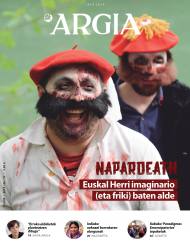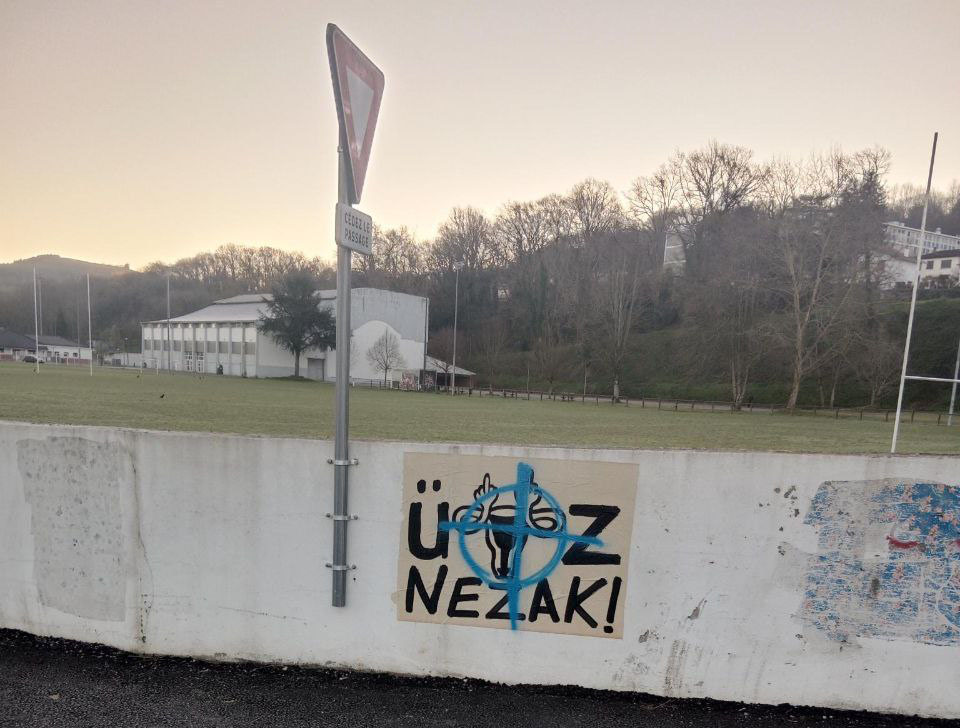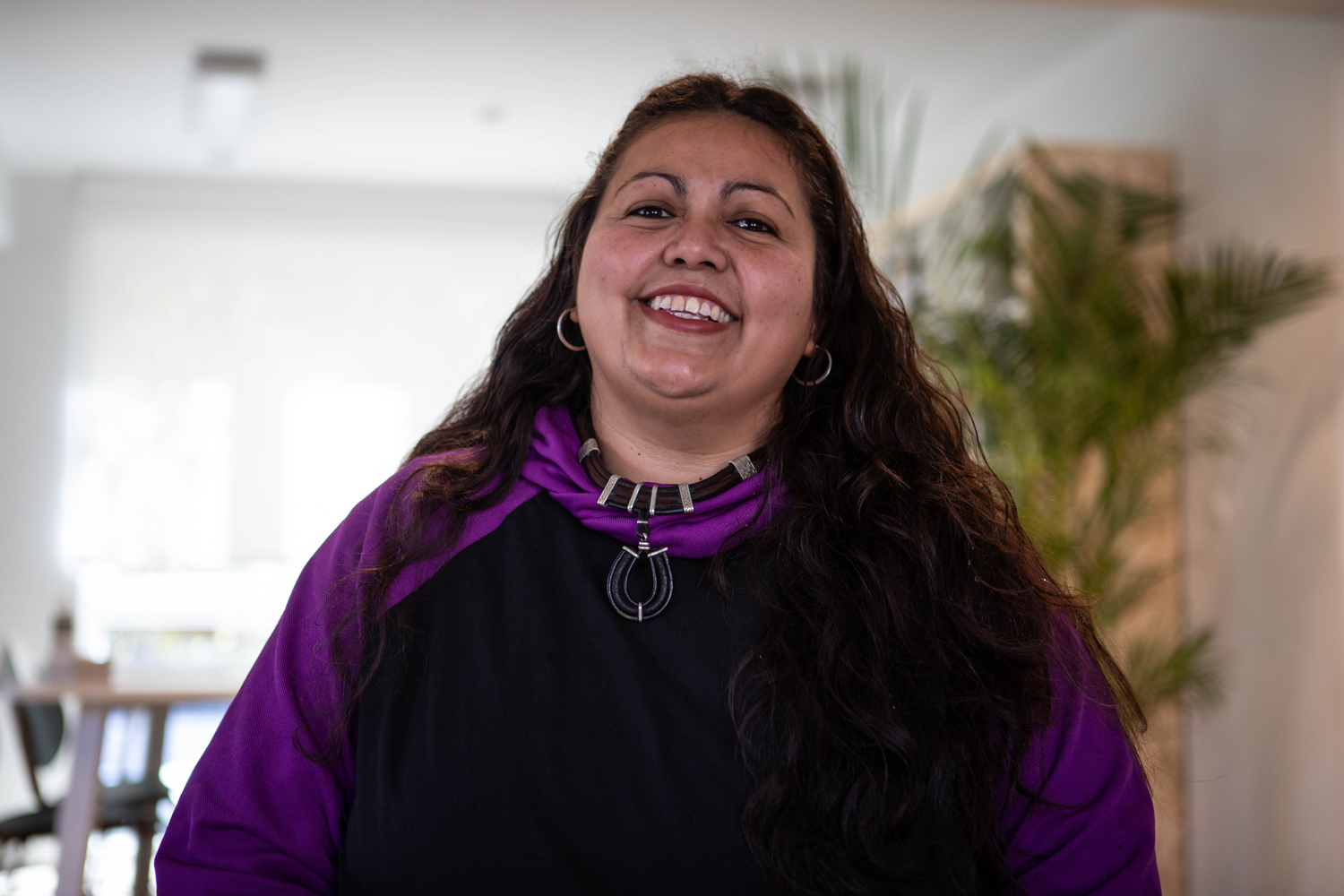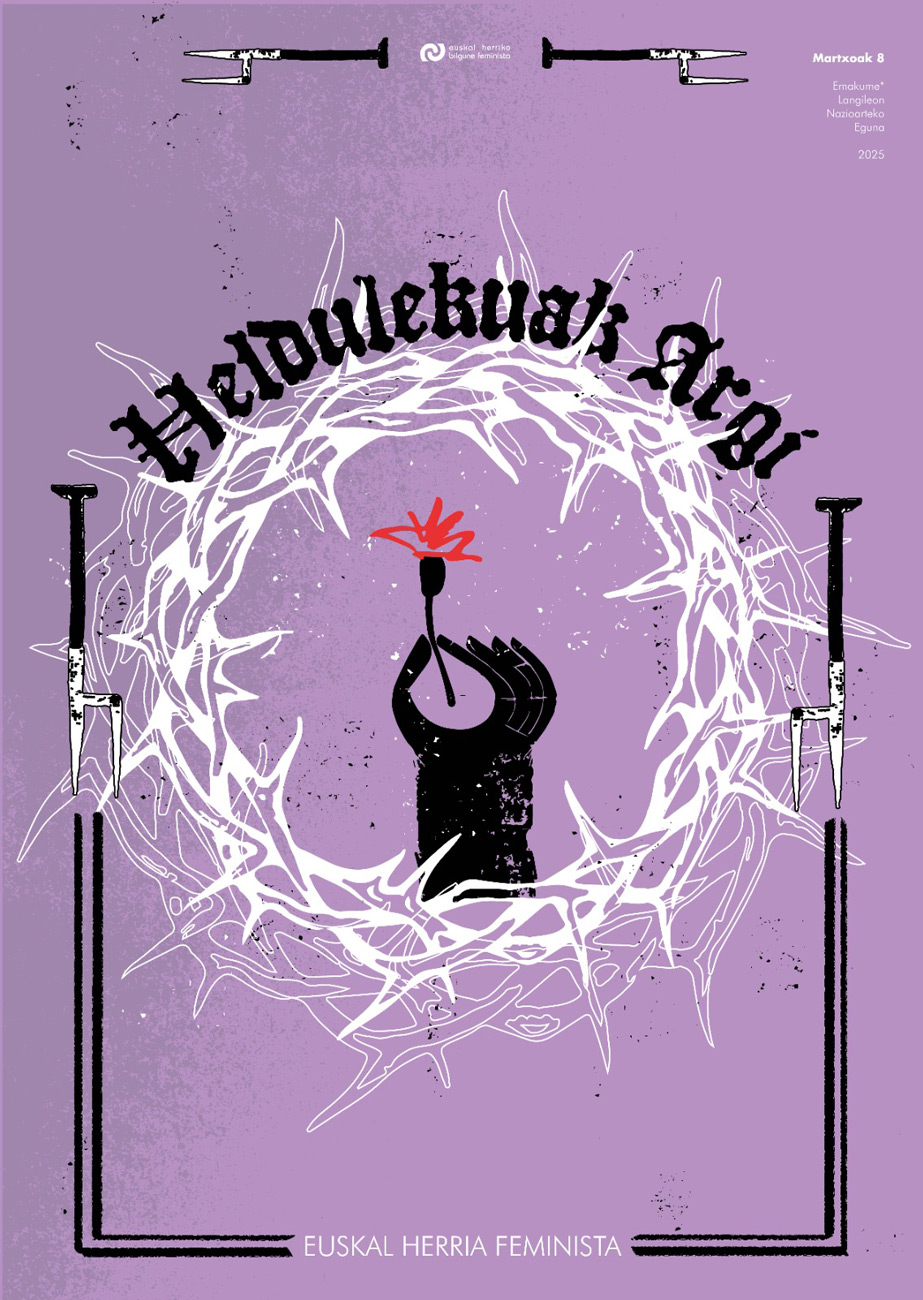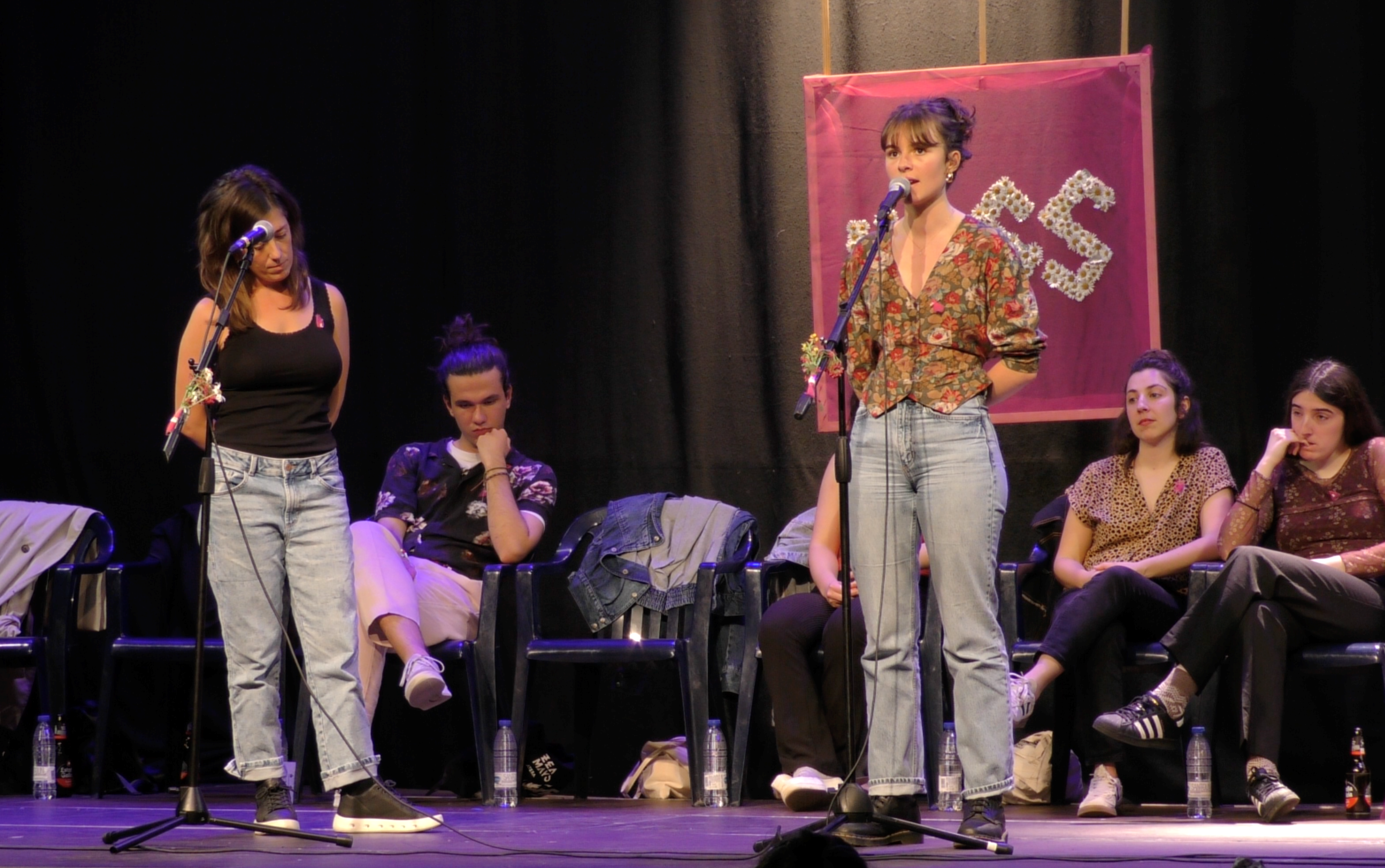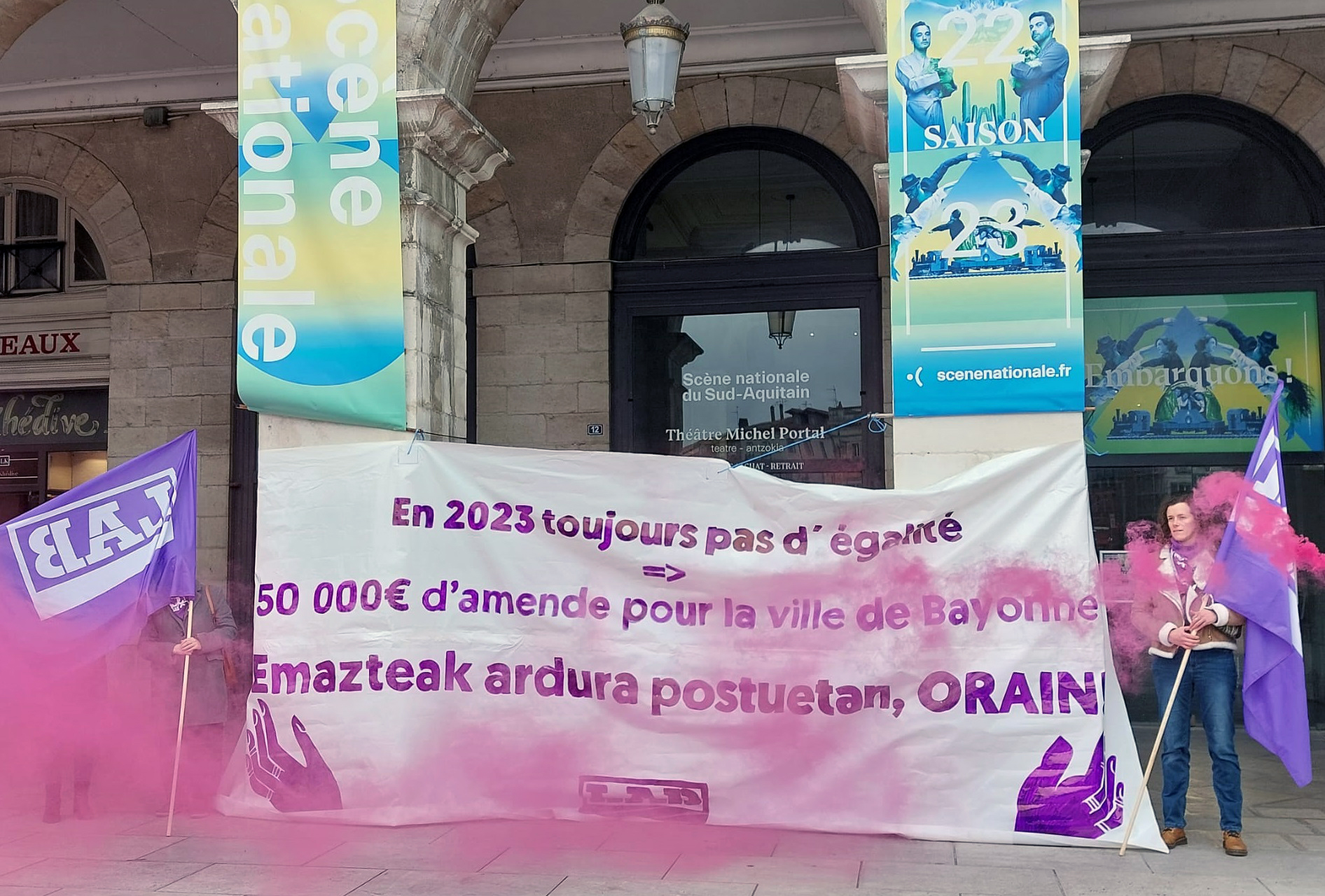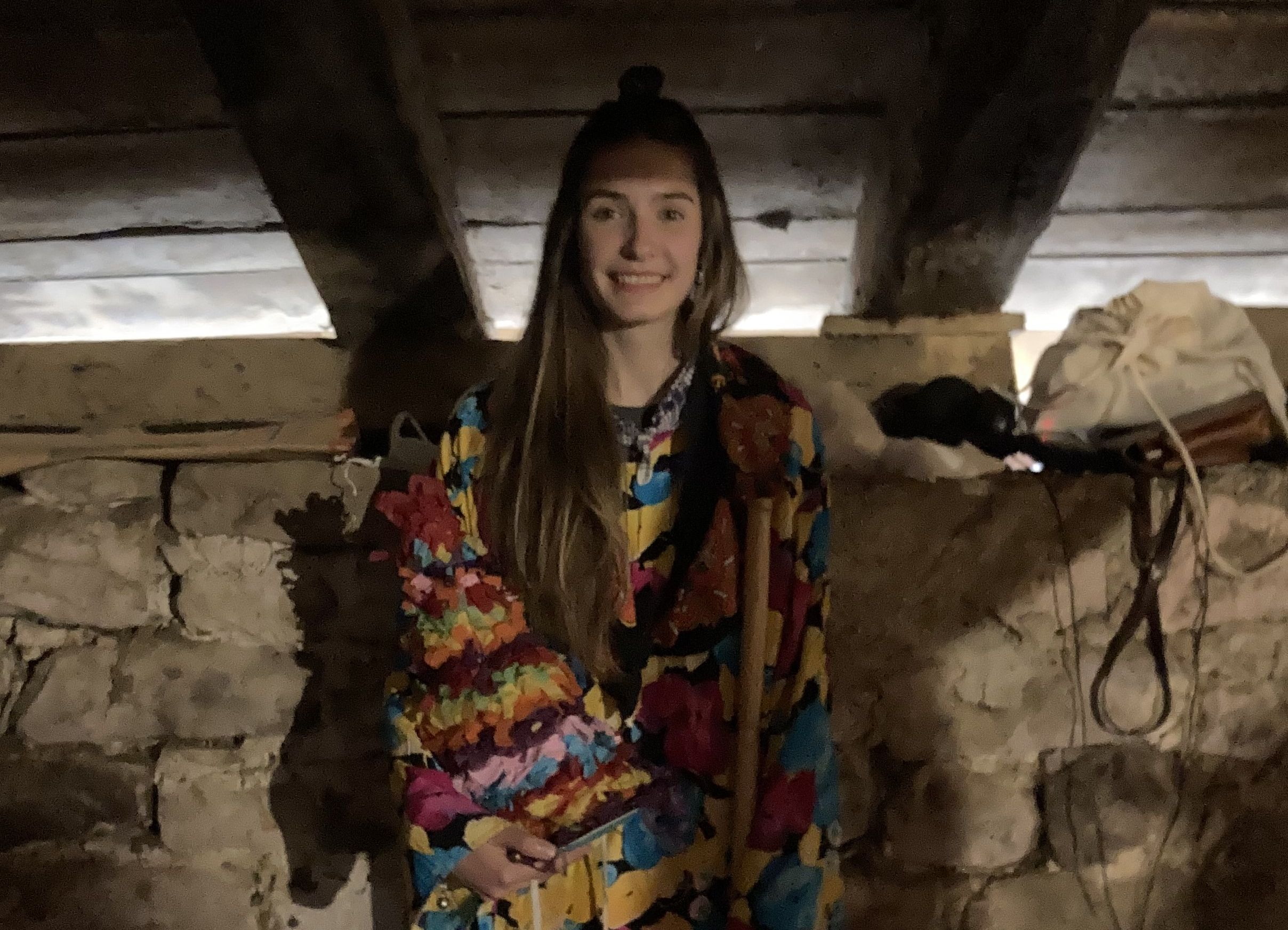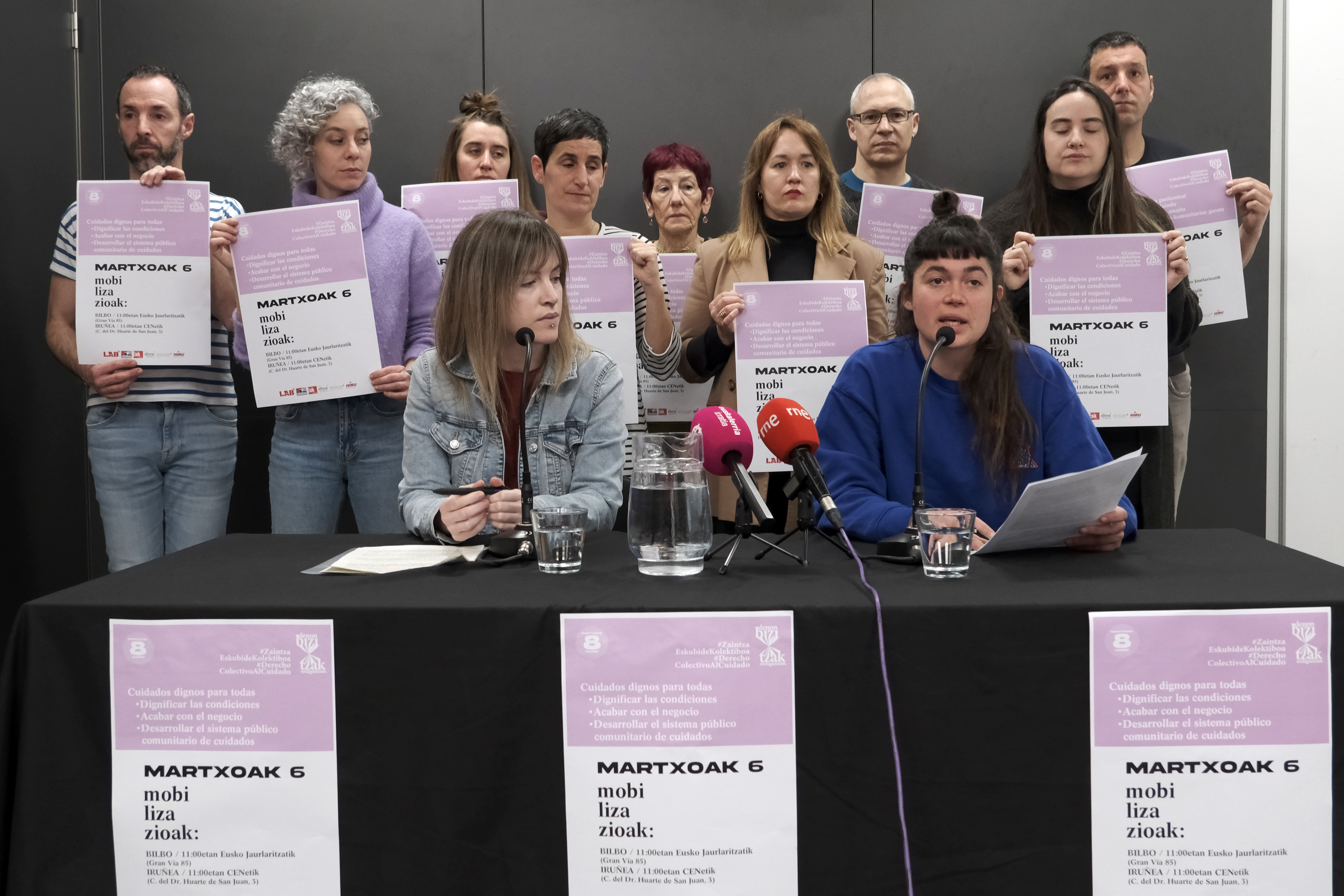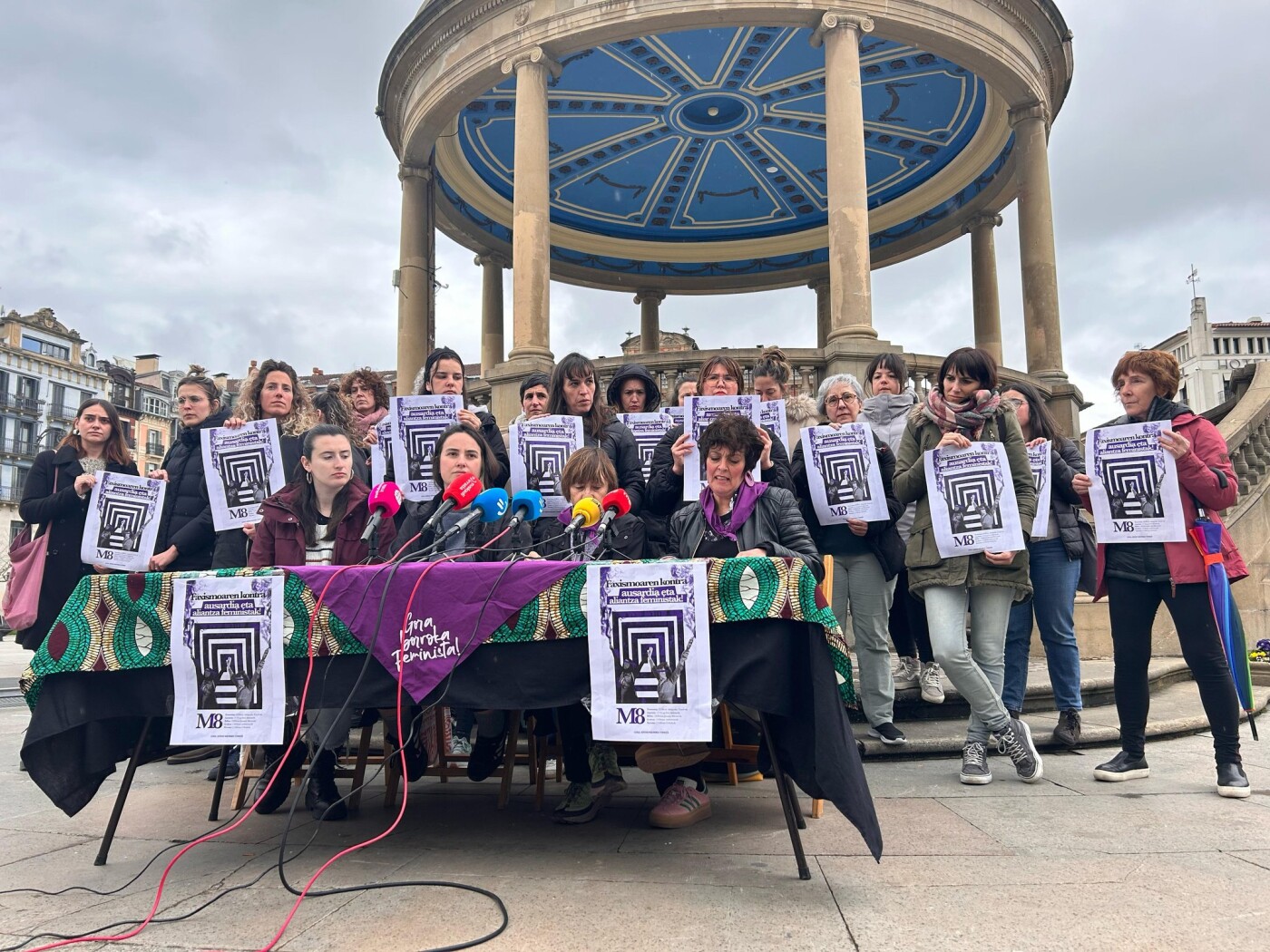"We make radical changes and institutions have no will to deliver"
- In January Saioa Iraola left the Euskal Herriko Bilgune Feminist coordination group after ten years of work, but has not finished burning and has been content with it. As she tells us, the activity of the last decade has been a gift: feminist militancy has given her a place to be and look at the world. Since that watchtower, we have talked about his trajectory.
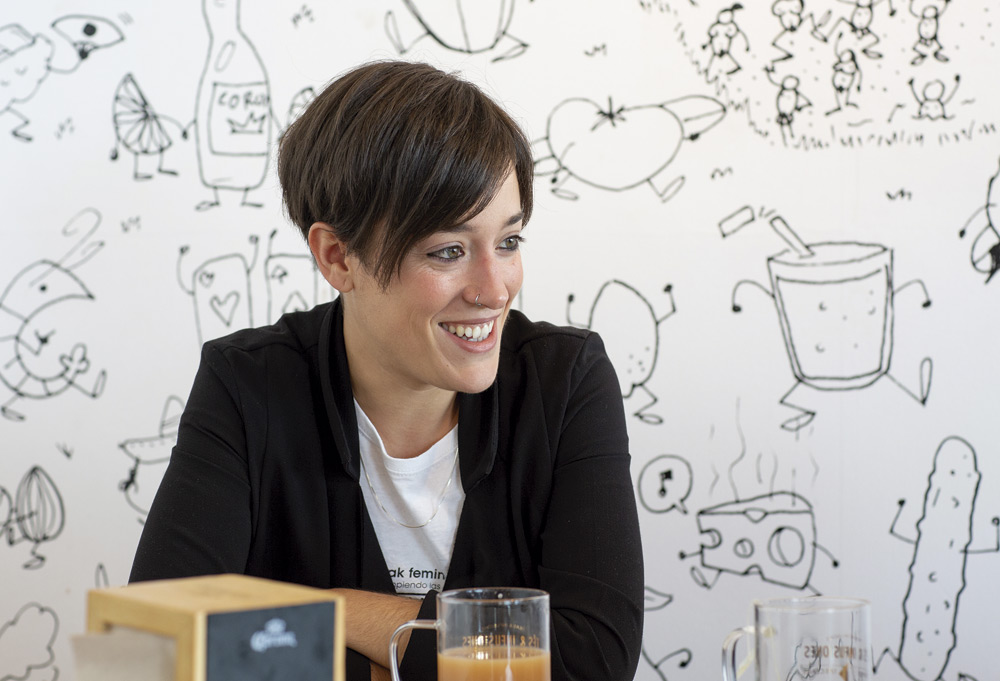
Gaztetatik militatu du mugimendu feministan. Kazetaritzako lizentziatura eta feminismo eta genero-ikasketen masterra egin ditu. Hainbat komunikabidetan kolaboratu du, besteak beste: Karrape Irratia, Info 7 irratia, Gaur 8 eta Ttipi-Ttapa aldizkariak. Formakuntza feministan ere ibili da, hitzaldiak ematen.
If I am not mistaken, the place of birth has had a great influence on its political trajectory.
I'm from Leitza and living in a village like this -- in a small town, where hegemonic masculinity and tradition are strong -- marks the young woman. For example, it's a town very attached to the ball: When we were 7 years old, three girls started for the first time in the ball school there, and there we were able to see, at the moment we were claiming our site, the resistances of both the kids and the parents. We didn't understand it, but we're still on our way.
The first action was carried out in Leitza.
Yeah, around the trash can of Sarriopapel. In 2008, I and Jon, another colleague, wrote an opinion article to denounce the situation of Sarriopapel, with the help of Lurdes from LAB: Since 1976, they had not hired a woman for manual labor for 40 years. There were some 460 workers in the company. Even though LAB had already worked on this issue within the company, we decided to take the issue out on the street and did a lot of socialization work in the village, to see how women could not be hired by hand. In June 2011 we carried out a campaign to collect the curricula of the women of the locality and region: We picked up over 60, and with a symbolic action, we went to the factory and delivered them there. That same day, they started calling women.
So, you succeeded.
Yes. Nineteen women were hired in that summer and women have been hired every year since then, as demand for work increases in summer. Some have fixed positions.
How did the people receive it?
There was a great whirlwind. In the end, this economic institution has a huge impact on the people and they asked us how we opposed it. We said that we were not acting against this, but in defence of our lives and the future of our people, so that the women of the people and the region would have the opportunity to work in the same people.
In these ten years of work in the coordination team of Bilgune Feminista, a lot has happened. Among other measures, ETA declared a permanent and verifiable cease-fire in the framework of a joint declaration. You have presented your reading.
Before the Aiete peace conference, we received an invitation from the international group and met them on the eve of Sunday. We, until then, have worked mainly on two lines: on the one hand, we believed that the participation of women should be encouraged, that women should be given the means to participate in the projects that emerged in the resolution of the politico-armed conflict. On the other hand, we felt that a feminist perspective should be incorporated into the characterization of conflict and peace.
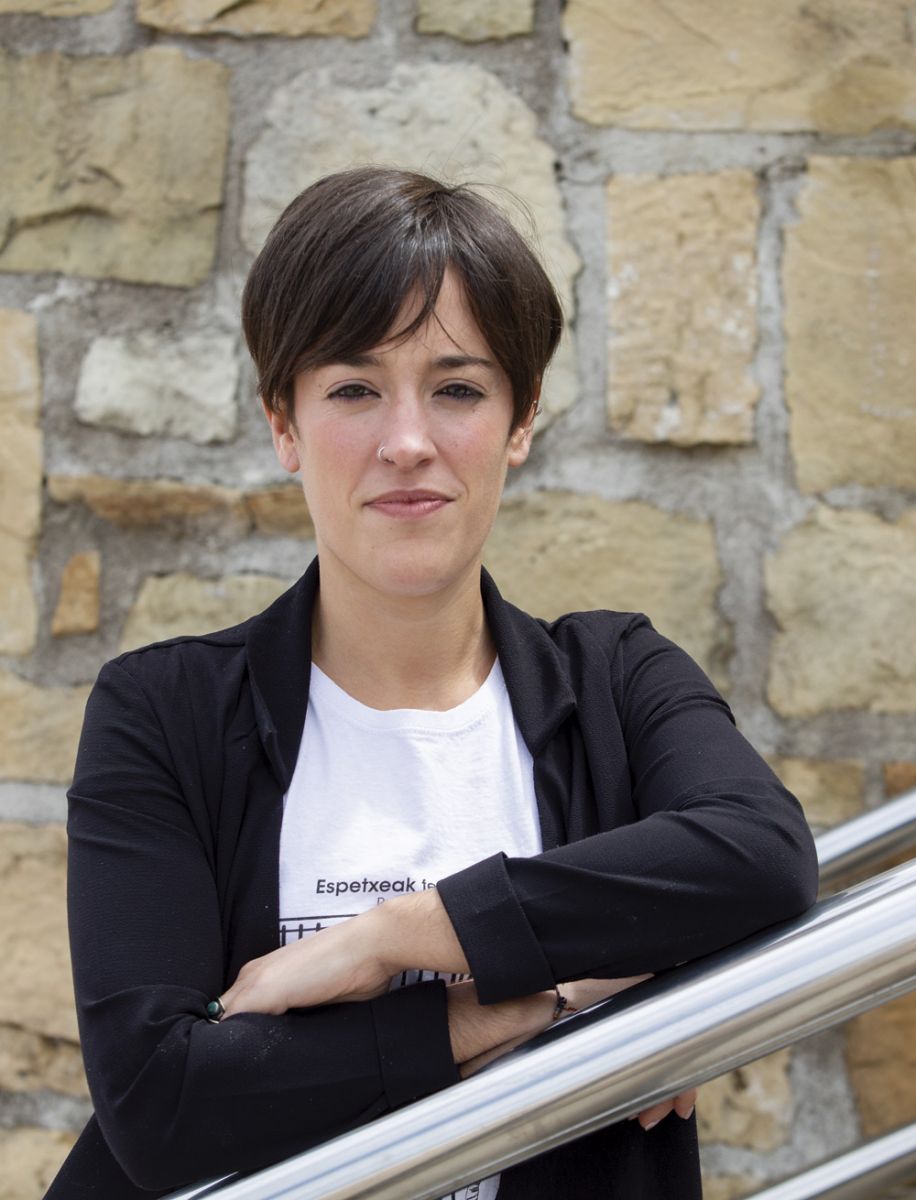
You claimed, among other things, “this is not our peace.”
Some people told us that this was not the time to raise it, but we asked, and we wanted to put on the table that peace is not just the end of a certain violence, that in our country there has been an armed political conflict with other violence and that it is still today. There will be no peace in our people until all of them are taken into consideration and resolved. We didn't want to downplay what was happening, but we wanted to put our perspective on the table.
Since then, a road has been made, has it not?
Yes, I see that there has been development. In many people who have had the power and opportunity to dynamize and participate in this process, I have seen a great development towards feminism and towards these proposals, openness. On the other hand, at the Social Forum there is a gender working group, which is doing incredible work, I think you're an example of this campaign. Eight years ago, I don't think that in Euskal Herria, in the feminist movement, we were so many feminists concerned about that, and now it seems to me to be yes. There has been a great deal of development and I welcome it.
Thanks to your work, I met the community feminists of Guatemala and my proposal for feminist conformation. What is that?
It is a proposal prepared by the community feminists of Abya Yala [the people of Panama and Kuna of Colombia, who gave name to America before the arrival of Christopher Columbus]. As a consequence of colonization, indigenous peoples set aside their worldviews until then, and this has affected them in the body, in beliefs, in spirituality… But violence does not only come from what has been called “American conquest”, but these feminists have asked themselves, for example, how patriarchy was reflected in their indigenous peoples and how it influenced their bodies. For all these reasons, community feminists are carrying out the process of decolonization of their bodies: how they see the world, how they want to see, what relationship they have with their bodies, how they want to be ... All of this is being recovered and reallocated.
How have you dealt with this proposal?
One of our strategic lines is the feminist constitution. On the one hand, we have become aware and wondering how the political history of Euskal Herria has affected us, militants of Bilgune Feminist. We are affected by many things: armed political conflicts, violence against women as a tool of patriarchy, being workers, precarious situations, being lesbians… We want to complement them all, collectively. But in addition, we ask ourselves: How did the witch hunt in Euskal Herria affect us? Women's bodies were burned. In that community that lived in Euskera, we did not have books, and they burned our bodies precisely because there were no books, and the wisdom that was in our bodies, the resistance that was in our bodies… And what do we read about all that? How does it affect us? How did the implantation of modernity influence the sixteenth century? In the age of modernity, here was a unique state, a unique way of thinking, a single hegemonic language, and those who were colonizers in our country, then, or at the same time, went to Abya Yala, and today these subjects are, among others, those who trample on the bodies of women in our country.
"What is the feminist movement Spanish?" I do not agree. Moreover, the work we are doing in the feminist movement is not being done in other movements for the Basque Country"
But at the same time, we live in the West.
Yes. We live in Europe, we live in Euskal Herria and we have a privileged position. Our analysis must come and go, go to the past – to name and to own all those oppressions we have experienced – but also to the future. Today, as Basques, we are part of some neocolonization processes: for example, what is Iberdrola doing in Brazil and how do we deal with it? So feminism has to be very attached to a social, political and economic transformation, so we feel it and we live it. In the things that neoliberalism is doing, for example, in those decisions to stifle borders, we have to position ourselves politically.
So, should we put life at the centre, under another slogan of feminism?
Putting life in the middle doesn't mean claiming life in capital letters, it means taking a political stand in front of life, and that means that maybe we can't eat the pineapple or the banana brought from where I don't know. We have to give their political dimension to the small everyday decisions, their importance, because otherwise we will not be able to transform Euskal Herria from feminism. We need general strategies, of course, but we need to be aware of the everyday and build the affective ones nearby. In everyday life we have to cross women and citizens of all kinds, and if we don't cross, if we don't look at each other and recognize each other in the face, we will hardly create alliances. I think that's one of the challenges on the left. We can't talk about big partnerships if I'm going to buy bread on a daily basis and I don't look in the eyes of the newcomer next to me.
Many times, looking in the eyes makes you a mirror and warns you of your privilege. But when the possibility of dialogue arises, you also have the opportunity to make known the oppression you feel at a time, such as linguistic oppression, and give way to the exercise of empathy.
You mentioned language. Another of your challenges is to create feminism from Euskera and Euskera.
We were questioned on 8 March, that the feminist movement was Spanish and that it was a Spanish demonstration on 8 March in Bilbao. What is the feminist movement Spanish? I do not agree with that, and I will say more: as far as language is concerned, and to the extent that the Basque language is a non-hegemonic language, as María Reimondez says, the work we are doing in the feminist movement is not being done in any other movement, nor in the movement for the right to decide, nor in any other movement. But what happens? When we meet thousands of people, the linguistic reality of our peoples is evident. Here we must not denounce that our demonstration has been Spanish, we must denounce that in this country there is a neoliberal policy with language and claim the right to learn Basque for free, programs, opportunities, mass Euskaldunization: that is what we must demand, and not because the feminist movement is Spanish.
.jpg)
Has the feminist movement in Euskal Herria managed to become a political interlocutor?
Thanks to feminist strikes, women who previously felt unrelated to feminism today are not so much and have wanted to go out into the streets to deal with their situations of unease and injustice. They have found their place in mobilizations. But there is a great leap towards political dialogue. Today we have not achieved the capacity of a political party or a trade union for political dialogue, and I would say more, the structure of the movement is not prepared to respond to that at this time. In any case, it's very easy to get out on the street on March 8th, but if you go to the root, then you see the differences. The feminist movement in Euskal Herria proposes radical changes and proposals, and today that will does not exist from the institutions, because today in our country the approach of many institutions is that of the right and can be added to the demonstration, but then, for example, there is no regulation for domestic housewives outside the special regime, although we have asked for it time and time again. There is no willingness to make real demands.
At the beginning of November, the V Prizes Ades Esku Dago will be held in the Basque Country. Feminist Conferences. Motto: “If there is broth.”
The main objective of these days is to strengthen the feminist movement. At the moment, many women have embraced feminism, they are acting as feminists in different fields, but militancy has changed. We live in more liquid militias than we were ten years ago, and in this context, we have a lot of people in mobilisation. But what structure, what skeleton does movement have? I believe that these days are absolutely necessary to strengthen the structure of the movement and to take steps towards a healthy and stimulating militancy. I believe that the main objective is to achieve a shared agenda, beyond the discrepancy, being aware of it, end the days and say: The feminists of Euskal Herria have these five goals, and each of us in their field are pushing these processes forward, and we have these major debates. That would be great.
“Elkarrizketan aipatu ditugu batzuk, baina Iraolari galdetu diot ea zer nabarmenduko lukeen hamar urte hauen ostean, eta labur erantzuteko eskatu. Besteak beste, hauek aipatu ditu: mugimendu feministaren barruan, desadostasunak desadostasun, aliantza politikoak eta afektiboak egiteko borondatea eta aldarte ona egon dela; Aieteko bake konferentziak aukera berri bat ireki duela Euskal Herriarentzat eta bertako feminismoarentzat; ahalegin handia egin dela euskaratik eta euskaraz feminismoa teorizatzeko eta praktikan jartzeko; feminismoa profesionalizatu eta instituzionalizatu dela; militatzeko moduak aldatu direla; sexu-identitateak politizatzeko eta gorputzak politizatzeko lan handia egin dela –lesbianismoa, transexualitatea...– eta, Emakumeen Mundu Martxari esker, apustu handi bat egin dela, Euskal Herriko feministen posizioak ezberdinak izan arren, elkarrekin lan egiteko”.
Martxoak 8an egindako pintaketak gainetik margotu dituzte ikur faxistekin Zuberoako hiriburuan. Horren aurrean elkarretaratzera deitu dute, astelehenean.
Martxoaren 8a Getxo bere bizitokian igaro du: kumbia dekolonial eta antiarrazista topaketa antolatu du Algortako Herriko Tabernan, Abianen, Hija del Nopal DJrekin batera.
Argentinatik Getxora migratu zen Celeste Agüero, kantutegi herrikoi batekin eta poesia xuxurlatzeko... [+]
Mugimendu feministak manifestazioak egin ditu goizean Donostian, Gasteizen eta Iruñean eta arratsaldean Baionan eta Bilbon. Oinarrizko irakurketa partekatu dute, eta horri gehitu diote hiri bakoitzean bertako problematika, eragile eta ekimenen erreferentzia.
Bilgune Feministak Heldulekuak argi, Euskal Herria feminista leloa baliatu du M8an, azpimarratzeko feminismoak ematen dituela “datorrenari aurre egiteko tresnak”, eta gogorarazteko faxismoaren gorakadaren testuinguru hau helduleku horretatik irakurri eta borrokatu... [+]
MAITE: (biharko eguna antolatzen bere buruaren baitan) Jaiki, gosaldu, bazkaria prestatu, arropa garbitu, etxea garbitu, gizon hori jaiki, seme-alabak jaiki, hiru horien gosaria prestatu, haiek agurtu, erosketak egin, lanera joan, seme-alabak eskolatik jaso, merienda eman,... [+]
Festa egiteko musika eta kontzertu eskaintza ez ezik, erakusketak, hitzaldiak, zine eta antzerki ikuskizunak eta zientoka ekintza kultural antolatu dituzte eragile ugarik Martxoaren 8aren bueltarako. Artikulu honetan, bilduma moduan, zokorrak gisa miatuko ditugu Euskal Herriko... [+]
“Kasu, ez gitxu lo!”. Gure denbora eta manerekin baina heldu gira.
Azaroaren 25ean Baionako elgarretaratzera joan ez joan eta autoak nola partekatu pentsatzetik (joan-jina bi oren), bat-batean Lartzabalen elgarretaratze bat antolatu genuen, eta 47 emazte bildu!... [+]
Martxoaren 8a, Emakumeen Nazioarteko Eguna, munduan zehar milioika emakumeontzat berdintasuna, eskubideak eta justizia eskatzeko borroka eguna da. Hala ere, gerrek, gatazkek eta politika militaristen hazkundeak markatutako testuinguru global batean, inoiz baino premiazkoagoa da... [+]
Nahiz eta Nazio Batuen Erakundeak (NBE) 1977an nazioarteko egun bat bezala deklaratu zuen eta haren jatorriaren hipotesi ezberdinak diren, Martxoaren 8aren iturria berez emazte langileen mugimenduari lotua da.
Euskal Herriko Bilgune Feministak deituta elkarretaratzea egin dute Hernanin Iratxe Sorzabali elkartasuna adierazi eta "babes osoa" emateko. Inkomunikatuta egon zen uneak berriz ere epailearen aurrean kontatu behar izatea, "bizi izandakoak utzitako ondorioen... [+]
Lantzeko inauteri txikien kalejira ikusle guztien begietara urtero modukoa izan zen. Txatxoak, Zaldiko, Ziripot eta Miel Otxin herriko ostatuko ganbaratik jaitsi eta herritik barna bira egin zuten txistularien laguntzarekin. Askok, ordea, ez zekiten une historiko bat bizitzen... [+]
Martxoaren 6an 11:00etan Bilbon eta Iruñean mobilizazioak egingo dituzte sindikatuek, patronalak eta Eusko Jaurlaritza zein Nafarroako Gobernua interpelatzeko, zaintza eskubide kolektiboari dagokionez.
Martxoaren 8a hurbiltzen ari zaigu, eta urtero bezala, instituzioek haien diskurtsoak berdintasun politika eta feminismoz josten dituzte, eta enpresek borroka egun hau “emazteen egunera” murrizten dute, emakumeei bideratutako merkatu estereotipatu oso bati bidea... [+]
Martxoak 8a heltzear da beste urtebetez, eta nahiz eta zenbaitek erabiltzen duten urtean behin beren irudia morez margotzeko soilik, feministek kaleak aldarriz betetzeko baliatzen dute egun seinalatu hau. 2020an, duela bost urte, milaka emakumek elkarrekin oihukatu zuten euren... [+]









